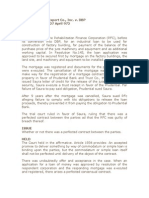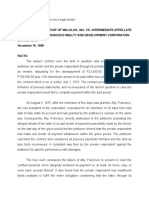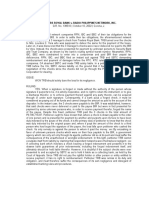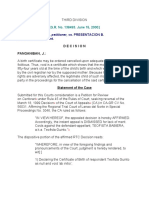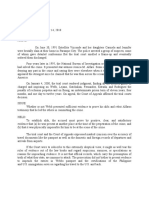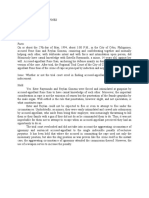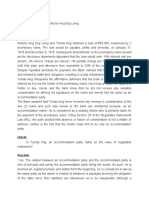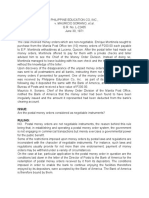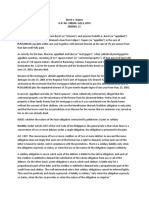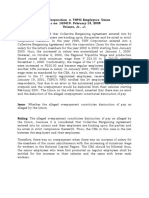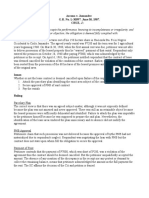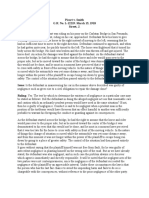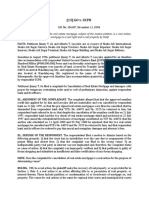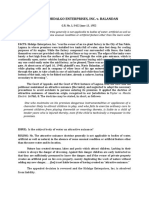ASSET BUILDERS CORPORATION v. STRONGHOLD INSURANCE COMPANY, INC.
ASSET BUILDERS CORPORATION v. STRONGHOLD INSURANCE COMPANY, INC.
Uploaded by
Ansai Claudine CaluganCopyright:
Available Formats
ASSET BUILDERS CORPORATION v. STRONGHOLD INSURANCE COMPANY, INC.
ASSET BUILDERS CORPORATION v. STRONGHOLD INSURANCE COMPANY, INC.
Uploaded by
Ansai Claudine CaluganCopyright
Available Formats
Share this document
Did you find this document useful?
Is this content inappropriate?
Copyright:
Available Formats
ASSET BUILDERS CORPORATION v. STRONGHOLD INSURANCE COMPANY, INC.
ASSET BUILDERS CORPORATION v. STRONGHOLD INSURANCE COMPANY, INC.
Uploaded by
Ansai Claudine CaluganCopyright:
Available Formats
ASSET BUILDERS CORPORATION v.
STRONGHOLD INSURANCE COMPANY,
INC.
G.R. No. 187116. October 18, 2010
MENDOZA, J.:
FACTS:
Article 1217 of the New Civil Code acknowledges the right of reimbursement from a co-debtor
(the principal co-debtor, in case of suretyship) in favor of the one who paid (the surety).
(Lucky Star) as part of the completion of its project to construct the ACG Commercial On April
28, 2006, Asset Builders Corporation (ABC) entered into an agreement with Lucky Star Drilling
& Construction Corporation Complex 3 Lucky Star was to supply labor, materials, tools, and
equipment including technical supervision to drill one (1) exploratory production well on the
project site. The total contract price for the said project was P1,150,000.00. To guarantee faithful
compliance with their agreement, Lucky Star engaged respondent Stronghold which issued two
(2) bonds in favor of petitioner. The first, SURETY BOND G(16) No. 141558, dated May 9,
2006, covers the sum of P575,000.004 or the required downpayment for the drilling work. On
May 20, 2006, ABC paid Lucky Star P575,000.00 (with 2% withholding tax) as advance
payment, representing 50% of the contract price. Lucky Star, thereafter, commenced the drilling
work. By July 18, 2006, just a few days before the agreed completion date of 60 calendar days,
Lucky Star managed to accomplish only ten (10) % of the drilling work. On the same date,
petitioner sent a demand letter to Lucky Star for the immediate completion of the drilling work
with a threat to cancel the agreement and forfeit the bonds should it still fail to complete said
project within the agreed period.
On August 3, 2006, ABC sent a Notice of Rescission of Contract with Demand for Damages to
Lucky Star
ISSUE: Whether or not Stronghold should be held liable.
RULING: Suretyship, in essence, contains two types of relationship – the principal relationship
between the obligee (petitioner) and the obligor (Lucky Star), and the accessory surety
relationship between the principal (Lucky Star) and the surety (respondent). In this arrangement,
the obligee accepts the surety’s solidary undertaking to pay if the obligor does not pay. Such
acceptance, however, does not change in any material way the obligee’s relationship with the
principal obligor. Neither does it make the surety an active party to the principal obligee-obligor
relationship. Thus, the acceptance does not give the surety the right to intervene in the principal
contract. The surety’s role arises only upon the obligor’s default, at which time, it can be directly
held liable by the obligee for payment as a solidary obligor.
In the case at bench, when Lucky Star failed to finish the drilling work within the agreed
time frame despite petitioner’s demand for completion, it was already in delay. Due to this
default, Lucky Star’s liability attached and, as a necessary consequence, respondent’s liability
under the surety agreement arose. In fine, respondent should be answerable to petitioner on
account of Lucky Star’s non-performance of its obligation as guaranteed by the performance
bond.
You might also like
- Aristotle's Investing Guide-CompressedDocument244 pagesAristotle's Investing Guide-Compressedmarcel100% (10)
- OrderInvoice - 53821082004769033Document1 pageOrderInvoice - 53821082004769033Yoyo Toyo100% (1)
- 7) Philippine Economic Zone Authority Vs Pilhino Sales CorporationDocument1 page7) Philippine Economic Zone Authority Vs Pilhino Sales CorporationFai Meile100% (1)
- Chapter 7 Workout SheetDocument14 pagesChapter 7 Workout Sheetanh sy tranNo ratings yet
- Doctrine: Moot and Academic Principle: Creditors Peso Debts Dollar DebtsDocument4 pagesDoctrine: Moot and Academic Principle: Creditors Peso Debts Dollar DebtsArrianne ObiasNo ratings yet
- Buenaventura VS MetrobankDocument2 pagesBuenaventura VS MetrobankAngelyn Suson100% (2)
- CB Vs CA - Tolentino (G.r. No. L-45710)Document2 pagesCB Vs CA - Tolentino (G.r. No. L-45710)Jona Myka Dugayo100% (1)
- MARQUEZ v. ELISAN CREDIT CORPORATIONDocument2 pagesMARQUEZ v. ELISAN CREDIT CORPORATIONEmmanuel Princess Zia SalomonNo ratings yet
- Digest - Javellana V Lim - GR 4015 (24 August 1908)Document1 pageDigest - Javellana V Lim - GR 4015 (24 August 1908)Rey BenitezNo ratings yet
- SPS ABELLA Vs SPS ABELLA - DigestDocument1 pageSPS ABELLA Vs SPS ABELLA - DigestCharles Roger Raya100% (1)
- Estate of Hemady v. Luzon Surety Co. DigestDocument2 pagesEstate of Hemady v. Luzon Surety Co. DigestNino Louis Belarma75% (4)
- Case Digest - Asset Builders Vs StrongholdDocument3 pagesCase Digest - Asset Builders Vs StrongholdDianaVillafuerteNo ratings yet
- Central Bank of The Philippines v. Citytrust Banking Corporation, G.R. No. 141835Document1 pageCentral Bank of The Philippines v. Citytrust Banking Corporation, G.R. No. 141835xxxaaxxxNo ratings yet
- Antich Res IsDocument21 pagesAntich Res IsMaritesCatayongNo ratings yet
- BPI Vs CA DepositDocument1 pageBPI Vs CA DepositArzaga Dessa BCNo ratings yet
- Doctrine: Pacto de Recto Sale Right of Redemption Equitable MortgageDocument2 pagesDoctrine: Pacto de Recto Sale Right of Redemption Equitable MortgageVaneza LopezNo ratings yet
- Union Bank V TiuDocument6 pagesUnion Bank V TiuPepper TzuNo ratings yet
- Odiamar vs. ValenciaDocument2 pagesOdiamar vs. Valenciazandree burgos100% (1)
- G.R. No. 205578. March 1, 2017.: Jalandoni Vs EncomiendaDocument1 pageG.R. No. 205578. March 1, 2017.: Jalandoni Vs EncomiendaKC Torayno100% (1)
- BPI vs. CA gr.136202Document2 pagesBPI vs. CA gr.136202Urumi KanzakiNo ratings yet
- Prudential Bank V Chonney LimDocument1 pagePrudential Bank V Chonney LimKayee KatNo ratings yet
- Case Digest - Filipino Pipe and Foundry Corp Vs NAWASADocument2 pagesCase Digest - Filipino Pipe and Foundry Corp Vs NAWASAMaxene Pigtain100% (1)
- (Credit Trans) Castillo vs. UniwideDocument25 pages(Credit Trans) Castillo vs. UniwideCHERRIE LOU A AGSOYNo ratings yet
- 4 Dao Heng Bank Inc. vs. LaigoDocument5 pages4 Dao Heng Bank Inc. vs. LaigoRolando Mauring ReubalNo ratings yet
- San Miguel Corp v. PuzonDocument1 pageSan Miguel Corp v. PuzonPre PacionelaNo ratings yet
- 03 Cordova vs. Reyes Daway Lim Bernando Lindo Rosales Law OfficesDocument2 pages03 Cordova vs. Reyes Daway Lim Bernando Lindo Rosales Law OfficesAlec VenturaNo ratings yet
- Digest-MWSS v. DawayDocument2 pagesDigest-MWSS v. DawayNamiel Maverick D. BalinaNo ratings yet
- PNB vs. Heirs of Benedicto and Azucena Alonday, 805 SCRA 657, G.R. No. 171865 (October 12, 2016)Document3 pagesPNB vs. Heirs of Benedicto and Azucena Alonday, 805 SCRA 657, G.R. No. 171865 (October 12, 2016)Lu CasNo ratings yet
- Marquez V Elisan CreditDocument3 pagesMarquez V Elisan CreditJustineNo ratings yet
- Spouses Carpo VS ChuaDocument2 pagesSpouses Carpo VS ChuaRengie GaloNo ratings yet
- BACHRACH CORPORATION Petitioner Vs THE HONORABLE COURT OF APPEALS and PHILIPPINES PORTS AUTHORITY RespondentsDocument2 pagesBACHRACH CORPORATION Petitioner Vs THE HONORABLE COURT OF APPEALS and PHILIPPINES PORTS AUTHORITY Respondentspaterson M agyaoNo ratings yet
- Agro Conglomerates and Soriano v. CADocument3 pagesAgro Conglomerates and Soriano v. CAAntonio RebosaNo ratings yet
- DBP V MIRANGDocument1 pageDBP V MIRANGTricia100% (1)
- Loreto D. de La Victoria Vs Hon. Jose P. BurgosDocument2 pagesLoreto D. de La Victoria Vs Hon. Jose P. BurgosLenie SanchezNo ratings yet
- Prudential Bank vs. IACDocument2 pagesPrudential Bank vs. IACVanya Klarika NuqueNo ratings yet
- Spouses Reyes & Maravillo v. Heirs of Malance (Acedillo: Credit Digest)Document2 pagesSpouses Reyes & Maravillo v. Heirs of Malance (Acedillo: Credit Digest)Francisco Ashley AcedilloNo ratings yet
- Security Bank v. CuencaDocument2 pagesSecurity Bank v. Cuencad2015memberNo ratings yet
- R. Marino Corpus vs. Court of Appeals and Juan T. DavidDocument1 pageR. Marino Corpus vs. Court of Appeals and Juan T. DavidJan Michael LapuzNo ratings yet
- CARODAN v. CHINA BANKING CORPORATIONDocument2 pagesCARODAN v. CHINA BANKING CORPORATIONEmmanuel Princess Zia SalomonNo ratings yet
- Aglibot Vs SantiaDocument1 pageAglibot Vs SantiaAlexylle Garsula de Concepcion100% (1)
- Metrobank vs. CA (GR No 88866)Document1 pageMetrobank vs. CA (GR No 88866)Katharina CantaNo ratings yet
- AFP RETIREMENT V SANVICTORESDocument2 pagesAFP RETIREMENT V SANVICTORESBeverlyn Jamison86% (7)
- Teddy G. Pabugais vs. Dave P. SahijwaniDocument1 pageTeddy G. Pabugais vs. Dave P. SahijwaniLouie Marrero DadatNo ratings yet
- Vil-Rey V LexberDocument1 pageVil-Rey V LexberRobert Rosales100% (2)
- Bognot vs. RRI Lending Corporation Case DigestDocument1 pageBognot vs. RRI Lending Corporation Case Digestambahomo100% (1)
- CA Agro-Industrial Development Corp. v. CADocument2 pagesCA Agro-Industrial Development Corp. v. CAiwamawi100% (1)
- 12 DIGEST Fideliza J. Aglibot vs. Ingersol R. Santia, G.R. No. 185945, Dec. 5, 2012Document2 pages12 DIGEST Fideliza J. Aglibot vs. Ingersol R. Santia, G.R. No. 185945, Dec. 5, 2012Sarah CruzNo ratings yet
- CASE No. PNB vs. CA, 147 SCRA 273Document1 pageCASE No. PNB vs. CA, 147 SCRA 273Al Jay MejosNo ratings yet
- PROPERTYDocument2 pagesPROPERTYChaMcband100% (1)
- 18 Anchor Vs FurigayDocument2 pages18 Anchor Vs FurigayCherry Amor Venzon OngsonNo ratings yet
- Oblicon Cases 29Document32 pagesOblicon Cases 29JoseReneRomanoCruelNo ratings yet
- Abubakar vs. Auditor General (81 Phil 359)Document1 pageAbubakar vs. Auditor General (81 Phil 359)Katharina CantaNo ratings yet
- Saura Import v. DBP DigestDocument1 pageSaura Import v. DBP Digestviva_33100% (2)
- Benjamin Evangelista V. Screenex, Inc. G.R. No. 211564. November 20, 2017Document2 pagesBenjamin Evangelista V. Screenex, Inc. G.R. No. 211564. November 20, 2017Czarianne Golla0% (1)
- Macalinao Vs BPIDocument1 pageMacalinao Vs BPIShanielle Qim CañedaNo ratings yet
- De La Paz Vs L & J DevelopmentDocument3 pagesDe La Paz Vs L & J DevelopmentMary Louisse RulonaNo ratings yet
- Luzon Dev't Bank V EnriquezDocument2 pagesLuzon Dev't Bank V EnriquezAnonymous hS0s2moNo ratings yet
- Case Digest, JD2A, Roman Catholic Bishop of Malolos, Inc. Vs IAC, 1990, JamerDocument2 pagesCase Digest, JD2A, Roman Catholic Bishop of Malolos, Inc. Vs IAC, 1990, JamerMargarita LouiseNo ratings yet
- Ledda V BpiDocument6 pagesLedda V BpiPaul de PhoenixNo ratings yet
- TRB V RPNDocument1 pageTRB V RPNeieipayadNo ratings yet
- MINA Vs Pacual, G.R. No. L-8321 October 14, 1913Document2 pagesMINA Vs Pacual, G.R. No. L-8321 October 14, 1913Jona Myka DugayoNo ratings yet
- Cred 1Document20 pagesCred 1It'sRalph MondayNo ratings yet
- Case Digest Asset Builders Vs StrongholdDocument2 pagesCase Digest Asset Builders Vs StrongholdMirai Kuriyama0% (1)
- Allied Banking Corporation V BPIDocument2 pagesAllied Banking Corporation V BPIAnsai Claudine CaluganNo ratings yet
- PP Vs SalomeDocument1 pagePP Vs SalomeAnsai Claudine CaluganNo ratings yet
- Babiera Vs CatotalDocument9 pagesBabiera Vs CatotalAnsai Claudine CaluganNo ratings yet
- Lejano vs. People G.R No. 176389Document1 pageLejano vs. People G.R No. 176389Ansai Claudine CaluganNo ratings yet
- Banguis-Tambuyat Vs Balcom TambuyatDocument2 pagesBanguis-Tambuyat Vs Balcom TambuyatAnsai Claudine CaluganNo ratings yet
- PP VS SiaoDocument1 pagePP VS SiaoAnsai Claudine CaluganNo ratings yet
- Fajardo vs. People G.R No 190889Document1 pageFajardo vs. People G.R No 190889Ansai Claudine CaluganNo ratings yet
- Del Carmen v. SabardoDocument1 pageDel Carmen v. SabardoAnsai Claudine CaluganNo ratings yet
- ANG V ASSOCIATED BANKDocument2 pagesANG V ASSOCIATED BANKAnsai Claudine CaluganNo ratings yet
- Jose Ponce de Leon V RFCDocument2 pagesJose Ponce de Leon V RFCAnsai Claudine CaluganNo ratings yet
- CALTEX V. INTEREDIATE APPELLATE COURT and ASIA PACIFICDocument1 pageCALTEX V. INTEREDIATE APPELLATE COURT and ASIA PACIFICAnsai Claudine CaluganNo ratings yet
- PECO V SORIANODocument1 pagePECO V SORIANOAnsai Claudine CaluganNo ratings yet
- Berot v. SiapnoDocument2 pagesBerot v. SiapnoAnsai Claudine CaluganNo ratings yet
- TSPIC Corporation v. TSPIC Employees UnionDocument1 pageTSPIC Corporation v. TSPIC Employees UnionAnsai Claudine CaluganNo ratings yet
- Cruz v. Tuason & CoDocument2 pagesCruz v. Tuason & CoAnsai Claudine CaluganNo ratings yet
- Azcona v. JamandreDocument1 pageAzcona v. JamandreAnsai Claudine Calugan100% (1)
- Ocampo III v. PeopleDocument1 pageOcampo III v. PeopleAnsai Claudine CaluganNo ratings yet
- Durban Apartments Corporation v. Pioneer InsuranceDocument2 pagesDurban Apartments Corporation v. Pioneer InsuranceAnsai Claudine CaluganNo ratings yet
- Contractual, Is Premised Upon The Negligence in The Performance of ADocument2 pagesContractual, Is Premised Upon The Negligence in The Performance of AAnsai Claudine CaluganNo ratings yet
- Ayala Corp v. Rosa Diana RealityDocument2 pagesAyala Corp v. Rosa Diana RealityAnsai Claudine CaluganNo ratings yet
- Picart v. SmithDocument1 pagePicart v. SmithAnsai Claudine CaluganNo ratings yet
- Go V UCPBDocument2 pagesGo V UCPBAnsai Claudine CaluganNo ratings yet
- IGLESIA NI KRISTO v. PONFERRADADocument2 pagesIGLESIA NI KRISTO v. PONFERRADAAnsai Claudine CaluganNo ratings yet
- Abellana v. PeopleDocument2 pagesAbellana v. PeopleAnsai Claudine CaluganNo ratings yet
- HIDALGO ENTERPRISES, INC. v. BALANDANDocument1 pageHIDALGO ENTERPRISES, INC. v. BALANDANAnsai Claudine CaluganNo ratings yet
- Pascual v. BallesterosDocument2 pagesPascual v. BallesterosAnsai Claudine CaluganNo ratings yet
- CHALLAN FORM No.32 ADocument3 pagesCHALLAN FORM No.32 AMIan Muzamil0% (1)
- Kisan Credit Card (KCC) and Crop Loaning SystemDocument17 pagesKisan Credit Card (KCC) and Crop Loaning SystemRajiv100% (1)
- The Shadow Banking System Creating Transparency in The Financial Markets (Document247 pagesThe Shadow Banking System Creating Transparency in The Financial Markets (József PataiNo ratings yet
- Step Three of The Wyckoff MethodDocument3 pagesStep Three of The Wyckoff MethodDeepak Paul TirkeyNo ratings yet
- MIDA - Malaysia - Cost of Doing BusinessDocument37 pagesMIDA - Malaysia - Cost of Doing BusinessBritish Malaysian Chamber of CommerceNo ratings yet
- Agriculture in Malta - A Historical NoteDocument18 pagesAgriculture in Malta - A Historical NoteKayliekayl Nha RuzkhaNo ratings yet
- Nursery Care Corporation Vs AcevedoDocument1 pageNursery Care Corporation Vs AcevedoLouana AbadaNo ratings yet
- Grade 10 PercentageDocument2 pagesGrade 10 PercentageHassan HussainNo ratings yet
- Macro Economics OutlineDocument7 pagesMacro Economics OutlineZainNo ratings yet
- 10 Steps To Start A Primary SchoolDocument10 pages10 Steps To Start A Primary SchoolShankar Jha0% (1)
- Fin 254 - Chapter 8Document46 pagesFin 254 - Chapter 8sajedulNo ratings yet
- Types of TaxesDocument58 pagesTypes of TaxesJuniorJayBNo ratings yet
- ACCODocument2 pagesACCOCj SernaNo ratings yet
- The Most Influential Journals in Academic Accountin PDFDocument23 pagesThe Most Influential Journals in Academic Accountin PDFvaniamarNo ratings yet
- Account Opening FormDocument4 pagesAccount Opening Formparamita mallikNo ratings yet
- Number of Months of Experience Related To Non-Farm Livelihoods in Rural Area in ODISHADocument6 pagesNumber of Months of Experience Related To Non-Farm Livelihoods in Rural Area in ODISHAMinatiBindhaniNo ratings yet
- Permit CJCDocument3 pagesPermit CJCNived Lrac Pdll SgnNo ratings yet
- HR Heads in HyderabadDocument45 pagesHR Heads in Hyderabadvk_bibwNo ratings yet
- Statement of Account: Date Tran Id Remarks UTR Number Instr. ID Withdrawals Deposits BalanceDocument1 pageStatement of Account: Date Tran Id Remarks UTR Number Instr. ID Withdrawals Deposits BalanceRohan TiwariNo ratings yet
- 25.pdffor All Subjects Notes VisitDocument6 pages25.pdffor All Subjects Notes VisitR.S.H100% (1)
- John F Carter - Profitable Strategies For TradingDocument66 pagesJohn F Carter - Profitable Strategies For Tradingscribd.punch074No ratings yet
- Project On Ratio Analysis and DCF Model of Mazagaon Dock Shipbuilders LimitedDocument6 pagesProject On Ratio Analysis and DCF Model of Mazagaon Dock Shipbuilders LimitedChriselle D'souzaNo ratings yet
- Risk Management and GovernanceDocument118 pagesRisk Management and GovernanceAltansukhDamdinsurenNo ratings yet
- Understanding OptionsDocument29 pagesUnderstanding Optionsedscribe100% (2)
- Profitability & Liquidity Ratio AnalysisDocument19 pagesProfitability & Liquidity Ratio AnalysisananditaNo ratings yet
- Articles of PartnershipDocument3 pagesArticles of PartnershipJoseph ReyesNo ratings yet
- Strategic Plan For Islamic Banking Industry 2021-25: State Bank of PakistanDocument24 pagesStrategic Plan For Islamic Banking Industry 2021-25: State Bank of Pakistanikhan809No ratings yet




















































